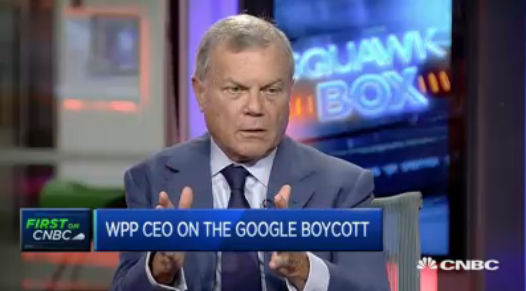Health Promotion Board - “Don’t Toy with Your Life” - Anti-Vape Campaign (2025)
“Don’t Toy with Your Life” is Singapore Health Promotion Board’s newest Vape-Free Campaign for 2025. It aims to


"They are media companies, they are not technology companies, they cannot masquerade as technology companies and they are responsible, just like you and everybody else, for the content that goes out on their channel and they have to take responsibility," Sorrel said in a live TV interview with CNBC. He added that in the long run, "Boycotting what is one of the most powerful, if not the most powerful medium, doesn't make sense." He has a point, excluding yourself from the largest media marketplace online is not going to serve you in the long run, but while everyone uses Google, Google is making the web poorer. This boycott may shake up the online hierarchy in the end, as digital media is a fraud and could use a cleanup.
Times of London ran an investigative piece stating that UK tax payers were funding terrorist organizations and hate groups, which led to the UK Government and the Guardian to pull all online ads immediately. We reported in February that the US 2017 Super Bowl commercials were running as pre-roll ads on terrorist groups channels.
"With duopolistic control or influence comes responsibility, and last time I checked Google's revenues and margins and Facebook's revenues and margins, they were certainly, I look at them with some degree of envy, it's true ... With authority or position comes a responsibility, and they have got to step up and take responsibility," Sorrell told CNBC.
while allowing ISIS recruiters to stay on the network doesn't work in the long run as users revolt due to arbitrary rule enforcement. Snapchat has received criticism due to ads appearing before or after explicit content and porn stars using advertisers lenses. Snapchat's guidelines prohibit users to distribute sexually explicit content in stories, but there are no tools in place that prevent it.
In 2015 Martin Sorrel revealed that Google had become WPP's biggest media partner, WPP invested $2.9 billion of its $75 billion media bookings into Google ads in 2014. Last year this number rose to $5 billion. WPP spends $1.7 billion on Facebook and $90 million on Snapchat advertising. Google is likely to make $72.69 billion in ad revenues in 2017. According to ABC.au news the Google ad boycott could cost them $750 million. Previously Sorrel has called Google a "frenemy", too big to avoid as you have no choice but to partner with them. This week Sorrell said WPP has partnered with Google to introduce technology to monitor where ads are appearing, but did not give further details and admitted that "you can't make things 100 percent brand safe."
See also this Drum interview from Cannes where he discusses "Google and Frenemies"src="adland.tv/tf-google/2006572555">Google is making the web poorer. This boycott may shake up the online hierarchy in the end, as digital media is a fraud and could use a cleanup.
, social media sites like Twitter has struggled to find what to ban. Banning controversial speakers to stay attractive to advertisers while allowing ISIS recruiters to stay on the network doesn't work in the long run as users revolt due to arbitrary rule enforcement. Snapchat has received criticism due to ads appearing before or after explicit content and porn stars using advertisers lenses. Snapchat's guidelines prohibit users to distribute sexually explicit content in stories, but there are no tools in place that prevent it.
In 2015 Martin Sorrel revealed that Google had become WPP's biggest media partner, WPP invested $2.9 billion of its $75 billion media bookings into Google ads in 2014. Last year this number rose to $5 billion. WPP spends $1.7 billion on Facebook and $90 million on Snapchat advertising. Google is likely to make $72.69 billion in ad revenues in 2017. According to ABC.au news the Google ad boycott could cost them $750 million. Previously Sorrel has called Google a "frenemy", too big to avoid as you have no choice but to partner with them. This week Sorrell said WPP has partnered with Google to introduce technology to monitor where ads are appearing, but did not give further details and admitted that "you can't make things 100 percent brand safe."
See also this Drum interview from Cannes where he discusses "Google and Frenemies"